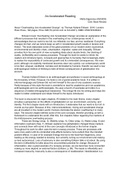An Accelerated Reading
Mette Elgersma (4543403)
CA4: Book Review
About “Overheating: Ann Accelerated Change”, by Thomas Hylland Eriksen. 2016. London:
Pluto Press, 192 pages, Price: €26,79 (at bol.com on 8-6-2021). ISBN: 9780745336343.
Eriksen’s book ‘Overheating: Ann Accelerated Change’ provides an explanation of the
different processes that resulted in the overheating of our contemporary world. It
acknowledges that our world is too full, too inflexible, too fast, and too neoliberal. Everything
changes too fast, and we cannot keep up with it. Accelerated growth results in tension and
friction. The book elaborates some of the great problems of our modern world: economical,
environmental and identity crises, urbanisation, migration, waste and inequality. Eriksen
provides from his own point of view compelling ideas about double binds, the clashing of
scales, (in)flexibility and runaway processes. Through his book he wants to inform his
readers and introduce topics, concepts and approaches to humanity that increasingly starts
to realise the impossibility of continued growth and its unintended consequences. His main
point, although not explicitly mentioned becomes clear very quickly: our contemporary world
is too fast, unequal, neoliberal, complex and dominated by humans, therefor we need a new
anthropological method of thinking to take all these consequences of globalization into
account.
Thomas Hylland Eriksen is an anthropologist and professor in social anthropology at
the University of Oslo. However, his book is not a typical academic book. It is written in
informal language and Eriksen did not limit himself to the use of only academic sources.
Partly because of this style the book is wonderful to read for academics and non-academics,
anthropologists and non-anthropologists. He uses a bunch of examples and refers to a
sequence of related ethnographical researches. This brings life into his writing and helps the
reader to better understand and relate himself to the topics introduced.
The book is structured into eight chapters. All related to the main theme, every chapter
provides a perspective on the effects of globalization on our environment, economy, and
identity. The first chapter starts with an introduction, it elaborates that our world is too full: le
monde as trop plein. Because of this, interconnectedness, mixing and accelerated change
are all inevident in the modern world. Humans dominate the planet, overflowing it in many
ways. The second chapter defines some of the core concepts, therefor providing us with a
framework to understand the world. After this, five chapters follow regarding five markers of
the Anthropocene overheating process.
These are Energy (chap. 3), Mobility (chap. 4), Cities (chap. 5), Waste (chap. 6) and
Information overload (chap. 7). Eriksen explains how globalization changed these markers
and connects them with some of the core concepts introduced in the former chapter.
Throughout his work he often uses the term runaway process. These are processes with
were once useful until its unintended side-effects became more evident than the intended
positive effects. In case of for example Energy this led to the fossil-fuel hegemony, once
leading us the energy needed to develop, but currently ruining our environment and making
us less autonomous. Loss of autonomy is also something Eriksen talks a lot about. By using
the term (in)flexibility he talks about the uncommitted potential for change. Because of
urbanisation, also a great example of a runaway process, we are becomes more connected
making us more depend on external factors (Eriksen, p. 88). This leads to inflexibility and
increased insecurity. Insecurity is also a consequence of neoliberalism. Neoliberalism is a





